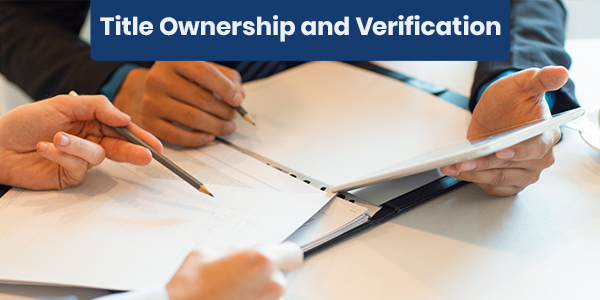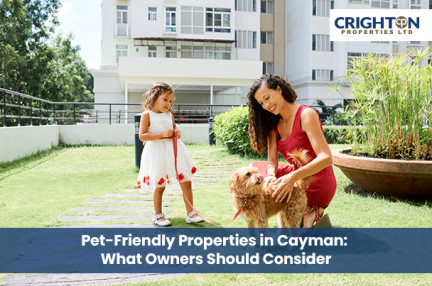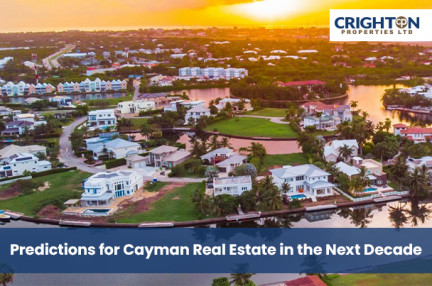
Ways to Add Value to Your Cayman Property Through Renovation
Discover smart renovation ideas that increase your Cayman property value, attract buyers, and maximize ROI in today’s competitive real estate market.
Crighton Properties | August 30, 2025
Real estate investment has traditionally been identified as one of the most reliable sources of long-term wealth. In the Cayman Islands, the same is even truer, given the market demand being rock-steady, the regulation being transparent, and the appeal being global. Cayman Islands real estate is then a very intriguing prospect for domestic and international buyers alike.
However, even in a stable and investor-friendly environment like Cayman, property ownership carries responsibilities and risks—commonly referred to as "liabilities." Whether legal, financial, or physical, these liabilities can quietly erode the value of an otherwise sound investment.
From title verification and maintenance costs to strata rules and environmental risks, understanding these liabilities is crucial to every investor, be it buying the first residential plot or expanding a portfolio of commercial properties. This blog will help you grasp what liabilities mean in the real estate context, the types of liabilities you may encounter in Cayman, and how to mitigate them while protecting your investment.
Liabilities in real estate relate to the structural, financial, or legal obligations that come with property ownership. These are only the responsibilities you take on when you buy, own, or rent a property; they are not always bad things.
Liabilities in real estate generally fall into one of the following categories:
Understanding these obligations is vital for making informed decisions and maintaining the long-term performance of your real estate investment.
The Cayman Islands offers a real estate landscape that is secure, transparent, and supportive of foreign ownership. The registration process is also streamlined, but that does not mean investors are exempt from liability. If anything, those unfamiliar with the legal system may face added risks due to oversight.
Here’s why investors in Cayman must take liabilities seriously:
These can affect profits and create needless complexities for investors. You can reduce risk and uncover long-term profit by being proactive with your planning and awareness.
When looking for properties for sale in the Cayman Islands, it is essential to consider factors beyond the purchase price. Even if there are no yearly property taxes in the jurisdiction, there are nevertheless substantial financial obligations:
In the majority of real estate transactions, buyers are required to pay a one-time stamp duty, which is typically 7.5% of the purchase price. This is non-refundable and payable at closure time.
You must pay monthly or quarterly strata fees if you buy a unit in a managed community or condominium. These include facility upkeep, insurance, and shared maintenance.
Owners are responsible for routine and emergency property maintenance. Costs vary widely depending on property size, location, and age.
In coastal regions that are vulnerable to floods or hurricanes, homeowner's and structure insurance is essential. Although it may be optional in certain situations, it is highly advised to safeguard your valuables.
Cayman’s real estate laws are clear, but due diligence is still required. Legal obligations may surface when the property is purchased, owned, or leased.

A clean title is essential. A transaction may be halted or delayed by disagreements or missing paperwork. To confirm ownership, buyers should always deal with an experienced lawyer or undertake a formal title search through the Lands & Survey Department.
Each parcel in Cayman falls under specific zoning regulations, be it residential, commercial, hotel/tourism, or mixed use. Zoning regulations can be broken by utilizing land beyond what is allowed, which can lead to fines or the loss of use rights.
Before constructing or altering any property, you must obtain permits from the Planning Department. Skipping this step can lead to fines or demolition orders.
Both residential and business lease agreements have obligations, regardless of whether you are renting out your home or leasing one from someone else. Carefully examine the terms pertaining to eviction, maintenance, and renewals.
In Cayman, structural liabilities can be influenced by the island’s natural conditions. Salt air, humidity, and hurricane exposure create unique challenges for building maintenance and long-term preservation.
Poor construction might result in roof problems, mold growth, or water damage, all of which can be costly to repair and reduce a home's potential for sale.
Flood risk in low-lying coastal areas demands elevated construction and adequate drainage planning. It’s essential to request a topographic survey or elevation certificate before purchase.
In non-urban areas, properties often use private septic systems. If not properly maintained or located too close to water bodies, these can become liabilities.
Owning real estate in Cayman is a rewarding venture, and with the right strategies, liabilities can be significantly reduced. Here are some best practices:
From title searches to reviewing zoning codes, legal professionals can ensure every box is ticked before you commit to a deal.
Whether building new or buying existing properties, always use licensed and well-reviewed professionals. Third-party inspections are your safeguard against future surprises.
Comprehensive coverage for property, contents, and liability ensures you’re prepared for natural or man-made damages.
If your property is part of a managed community, carefully read through the association rules and financial obligations.
Real estate investment in the Cayman Islands continues to attract attention for good reason: it offers stable growth, broad buyer protections, and unmatched lifestyle appeal. However, as with any high-value investment, understanding potential liabilities is just as critical as evaluating returns. That’s where working with a reputable Cayman real estate company, such as Crighton Properties, can make a significant difference. Their expertise can help you navigate responsibilities with greater clarity and confidence.
Whether you're an international investor expanding your assets or a first-time purchase, take the time to comprehend the full scope of ownership responsibilities. If managed properly and methodically, Cayman real estate may offer value that lasts for generations.
While it is not mandatory, it is strongly recommended. A local attorney can conduct title searches, review contracts, and ensure legal compliance.
There are no annual property taxes, but a one-time stamp duty applies at the time of purchase.
You might have to pay for some or all of the damage, depending on the rules of your lease and your insurance policy. It is advised to get landlord insurance to deal with such situations.

Discover smart renovation ideas that increase your Cayman property value, attract buyers, and maximize ROI in today’s competitive real estate market.

Looking for a pet-friendly home in Cayman? Learn key factors pet owners should consider, from amenities to community rules and more.

Explore expert predictions for the Cayman Islands real estate market over the next decade — trends, growth, and investment opportunities.